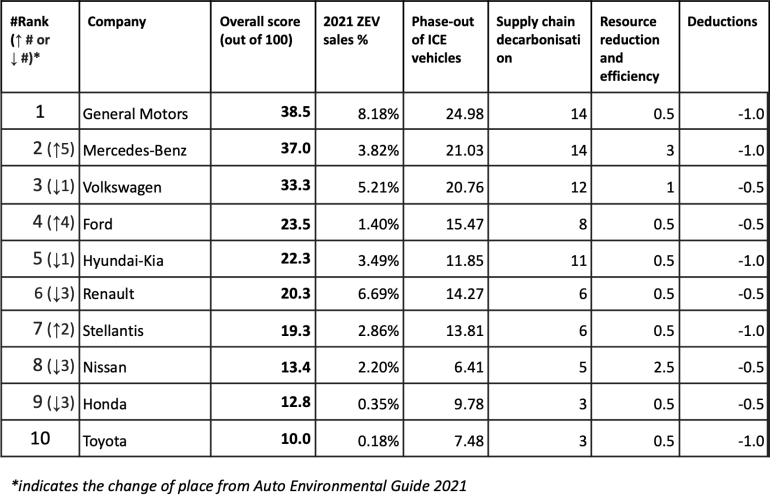Toyota ranks last in race to transition to EVs: Greenpeace
Japanese car giant places last for second year running in ranking by environmental advocacy group.

Toyota ranks last among the world’s top carmakers in the race to transition to zero-emission vehicles, according to a Greenpeace report.
The world’s largest carmaker placed last for the second year running in the ranking released on Thursday, followed by fellow Japanese brands Honda and Nissan, both of which dropped three spots from the previous year.
Keep reading
list of 4 itemsUN says ‘credible’ reports Ukraine children transferred to Russia
Xi and Putin expected to meet for first time since Ukraine war
The EU is not an honest broker between Israel and Palestine
General Motors ranked number one in the Auto Environmental Guide 2022 for its decarbonisation efforts, with electric vehicles (EVs) making up just under 8.2 percent of total sales.
Mercedes-Benz and Volkswagen ranked second and third, respectively, for transitioning to EVs, followed by Ford, Hyundai-Kia, Renault and Stellantis.
Greenpeace assessed the world’s 10 largest car manufacturers on three metrics: phasing out combustion engine vehicles, supply chain decarbonisation, and resource reduction and efficiency.

The environmental advocacy group said progress in the car industry was uneven despite sales of electric vehicles more than doubling last year.
While EVs last year made up 8.18 percent and 6.69 percent of total sales for General Motors and Renault, respectively, that figure dropped to just 0.18 percent for Toyota, while overall sales lagged in the United States compared with markets such as China.
“In 2021, 499 out of every 500 vehicles that Toyota sold were powered by fossil fuels – a shockingly high rate,” said Ada Kong, Greenpeace East Asia project lead.
“There is a lot of hype around electric vehicles right now, but the reality on the ground is that traditional automakers are not doing nearly enough to transition to zero-emission vehicles.”
A Toyota spokesperson said the carmaker was committed to the goal of carbon neutrality, noting that the company is investing 8 trillion yen ($55.6bn) as part of its efforts to reach annual EV sales of 3.5 million by 2030.
“In the area of production, we announced in 2021 that we would achieve carbon neutrality at all our global plants by 2035,” a spokesperson told Al Jazeera.
“We continue to promote the introduction and daily improvement of innovative technologies and the introduction of renewable energy and the use of hydrogen. In particular, with regard to renewable energy, we are introducing 100 percent renewable electricity at all plants in Europe and South America. Efforts are steadily underway in various regions.”
Greenpeace said carmakers should adopt ambitious zero-emission strategies for all markets, with the aim of ending sales of combustion engine vehicles in Europe by 2028 and in the US, China, Korea and Japan before 2030.
“The climate crisis is already here and we are increasingly feeling the impacts,” Kong said.
“Just last month Toyota suspended manufacturing operations in western China due to record-setting heatwaves. The world’s biggest auto brands need to recognise their own contribution to the climate crisis and commit to a full transition to zero-emission vehicles within the decade.”
Al Jazeera has contacted Honda and Nissan for comment.